Tax returns contain some pretty sensitive information. You would think that when a tax preparer collects your e-mail address, they might verify to make sure that it is your correct e-mail address. If that’s your assumption, clearly you are not H&R Block, which doesn’t particularly care whether they’re sending your personal information to you or not. [More]
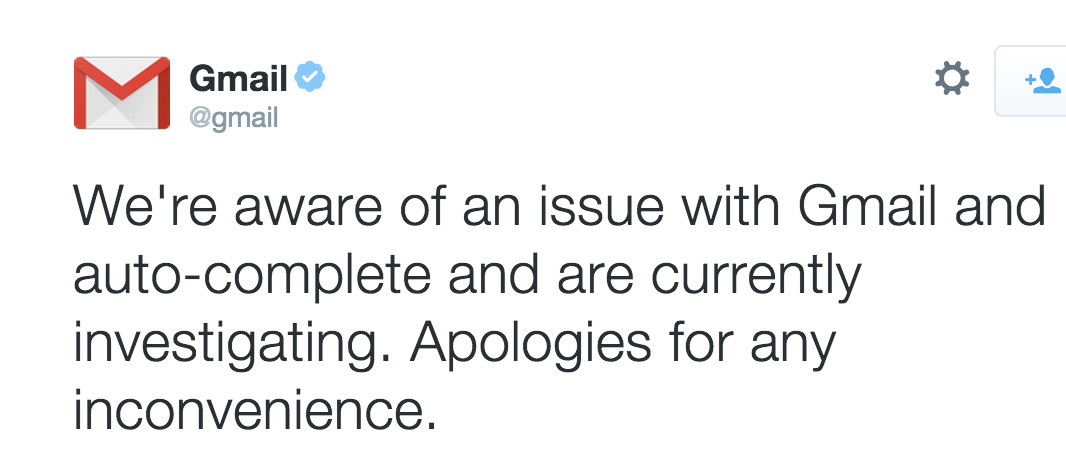
Check Before You Send: Gmail Is Screwing Up Auto-Complete E-Mail Addresses
When I go into Gmail to start an e-mail and type “D” in the address line, I know without even looking that it autocompletes to “Donny Donaldson,” my fictional best friend from summer camp. But if I typed in “D” today, it might autocomplete to “Debbie Debrason,” a fictional ex-girlfriend who I try to avoid. [More]

Casino E-Mails Problem Gamblers Who Specifically Asked To Be Left Alone
If you have a gambling problem, you can do something drastic but ultimately helpful: you can put yourself on a “self-exclusion” list that means you no longer receive e-mails or promotions from gambling companies. You can self-exclude from both real-life casinos and their online counterparts, so you won’t be allowed to play. The problem comes when something goes wrong, and those customers receive an e-mail blast. [More]
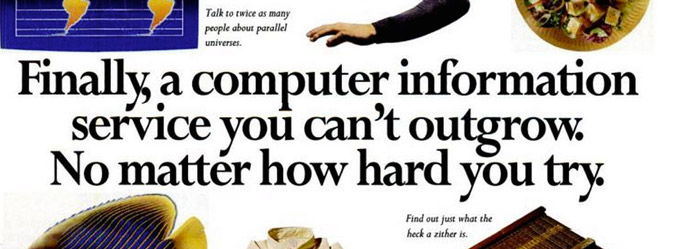
CompuServe In 1994: Here, You’ll Never Outgrow 60 E-Mails Per Month
Decades ago, our ancestors would purchase or receive in the mail “magazines,” primitive information delivery devices printed on shiny paper. Most of these magazines featured advertisements for products and services. In 1994, an ad for Popular Mechanics promoted CompuServe, a service that you could dial into with your modem. One that connected you to news, sports, weather, shopping, information, and included sixty e-mail messages per month. Sixty! [More]

Here Are Some E-Mails To Consumerist That We Don’t Understand
Here at Consumerist, we receive a wide variety of e-mails: reader complaints, pleas for help, links to news articles and blog posts, bafflingly irrelevant press releases, grammar corrections, insider confessions, and funny photos. We read and appreciate all of it, but sometimes we receive messages that we simply don’t understand. [More]

Yahoo Won’t Let Me Reclaim My Old E-Mail, Hasn’t Purged It Either
Ben was caught in the Great Yahoo Purge of 2013. The company figures that you’re not going to come back for the webmail address that you registered in 1999, and decided to “reclaim” usernames that hadn’t been used in a very long time for reuse. The problem was that Ben’s ID was still in the system, but not available for him to sign in to. [More]
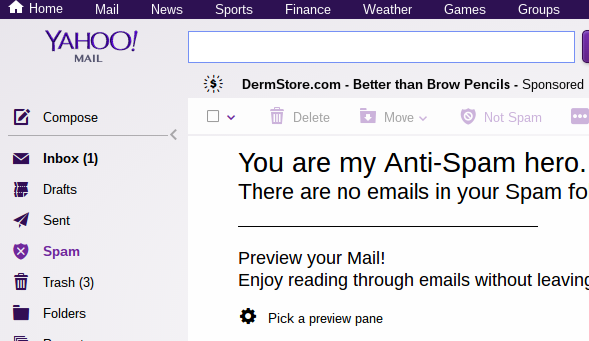
Even Yahoo Employees Want Nothing To Do With Yahoo Mail
If you’re one of the many Yahoo users (Yahoosers?) who hasn’t been terribly impressed with the numerous recent “upgrades” to the web giant’s e-mail service, you’re not alone, especially in the Yahoo offices, were 3-out-of-4 employees have apparently decided to just stick with Microsoft Outlook, in spite of the company’s pleas to switch. [More]
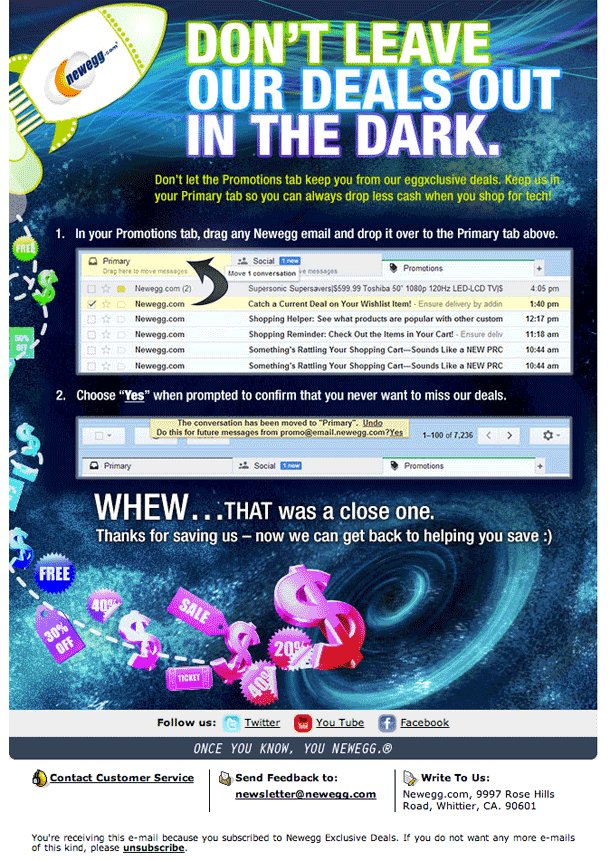
Newegg, Gap Beg Customers Not To Relegate Them To Gmail’s ‘Promotions’ Tab
Even though some early studies have showed that Gmail’s recent effort to put all of our marketing e-mails in one folder for us hasn’t really affected response rates for the businesses that blast us with e-mails, some companies are desperate to persuade us to keep them in our inboxes. Desperate enough to walk us through changing our e-mail preferences. [More]
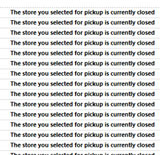
Best Buy E-mail System Really Wants To Make Sure I Know Store Is Closed
Victor gets it, Best Buy. He ordered a Vita memory card for in-store pickup, but the store is closed. He got the message the first time, but Best Buy decided to keep reminding him. Well, that, or their e-mail system has some kind of bug, but it’s fun to think about the system checking every five minutes or so to be sure: “nope, still closed.” [More]
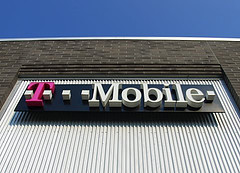
The EECB Gets T-Mobile Off My Back, $300 Refund
By harnessing the power of the executive e-mail carpet bomb, D. was able to end a nine-month “saga” with T-Mobile in less than 24 hours. “Go away,” they said (we’re paraphrasing.) “We didn’t take $297 from you without your permission.” Only they kinda did. [More]

AT&T E-Mails Me Stranger’s Account Statements, Shrugs
Eric was most likely an early adopter of Gmail, meaning that he was able to nab the address “elastname@gmail.com.” If you substitute in Eric’s actual last name for “lastname”, that is. The problem, as many early Gmail adopters can tell you, is that every other “E. Lastname” in the world seems to give out Eric’s e-mail address as his own. This time, it was serious: an AT&T business account holder gave the company Eric’s e-mail address, and now he’s getting notifications that have way, way more personal information than he’s comfortable having about a stranger. AT&T’s response? He should contact their customer himself. [More]

Gmail Decides That Gmail Messages Are Spam
Checking his spam folder, Richard was a little surprised at the reason that this mail service, Gmail, gave for tossing one message into the junk pile. How did they determine that he probably didn’t want this message? Well, because the return address was Gmail.com, and “[they’ve] found that lots of messages from gmail.com are spam.” [More]

Comcast E-Mail Rep Needs A Lot Of Words To Say 'I Have No Power To Help You'
Tired of waiting around on hold when she called Comcast, Susan decided to just send them an e-mail with what she had to say. What she had to say to them was “Hey, why did you charge me $64 too much for installation?” The e-mail representative she talked to had an answer to this question: taking four hundred words to say, “I dunno, take some time off work to go to your local Comcast office and maybe they can give you a refund.” [More]

Flooded With Nook Receipts, Never Bought A Nook
Anne Marie keeps getting notifications in her e-mail inbox about the content she just downloaded to her Nook. Which is weird, because she doesn’t have a Nook. Or a Barnes & Noble account. Stranger still, there’s no clear link between Anne Marie and the device’s owner. [More]

Survey: Barely Half Of E-Mails To Major Retailers Receive Adequate Responses
If you’ve ever written an e-mail to a retailer and either never received a reply or received one that did not adequately answer your question, you’re not alone. In fact, according to a new survey, retailers only provided complete responses to customers’ e-mails 54% of the time. [More]

Redbox Might Be Able To Stop Misdirected Receipts
Being an early adopter of something has its privileges and its disadvantages. Chris joined Gmail early enough that he gets to have an address that consists of his first two initials and his very common last name. That’s pretty neat for him, but has led to a really annoying case of mistaken identity. He keeps getting someone else’s Redbox receipts. A person who has a similar name, but lives in a different state and rents from Redbox an awful lot. The good news? Redbox has a solution for this. Kinda. [More]
Yahoo Shuts Down Decade-Old E-Mail Account, Shrugs
David is a paying customer of Yahoo, for web hosting services. It’s also been his e-mail account for the last decade. So why can’t he get an answer out of anyone there as to why they abruptly shut down his account a few weeks ago? He’s been locked out of his digital house on the Internet, and no one can tell him what he did wrong. Yahoo is an impenetrable fortress with no phones, designed to keep customers from talking to anyone with an idea what’s going on. [More]



